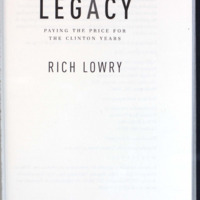-
Title
-
Legacy : paying the price for the Clinton years
-
Description
-
Assesses the Clinton legacy, arguing that it was his appeasement of America's enemies overseas that will be the longest lasting effect of the Clinton years, not his domestic accomplishments.
-
Identifier
-
1150471
-
895261294
-
Creator
-
Lowry, Rich
-
Source
-
Brian Lamb Booknotes Collection
-
Gift of Brian Lamb, 2011.
-
Catalog record
-
Language
-
eng
-
Date
-
2003
-
Program air date: November 9, 2003
-
Publisher
-
Regnery Pub.
-
George Mason University. Libraries. Special Collections & Archives
-
Text
-
Transcription of Annotations
Notes on front endpapers include a list of authors whose books on the Clinton administration are quoted in the book - e.g. Jeffrey Toobin, James Stewart, Michael Isikoff, George Stephanopoulos, Sidney Blumenthal, Bob Woodward, and David Halberstam - and a list of politicians who were interviewed by Rich Lowry for this book - e.g. Eric Holder, Bernie Nussbaum, Robert Reich, Leon Panetta, and Richard Holbrooke. Other notes state that the fantastic economy of the 1990's was not Clinton's creation, characterize both Clinton and Gingrich as immature, include comparisons between Clinton and Nixon and Clinton and Bush, references to the wars in Rwanda, Somalia, Yugoslavia and Kosovo, and to the three big scandals of the Clinton presidency - the 1996 reelection fund raising scandal, the pardon of Marc Rich, and the Lewinsky affair. Back endpapers contain notes claiming that Clinton's policy toward Saddam Hussein, Israel and Iran set the stage for the 9/11 attacks, and refer to other foreign policy mishaps, that lead the author to judge Clinton's legacy as a 'monstrous world-shaking failure'. Other notes include references to Clinton's health care plan, his policy on women in the military, on national security and on immigration. Also included are notes on Lieberman's and Henry Hyde's role during the impeachment proceedings, Clinton's mild reaction to North Korea having developed nuclear weapons, and the accusation that trade triumphed over weapons proliferation. -- Annotations by Brian Lamb in the margins and underlining of pertinent phrases throughout the book. -- Examples: p. 191: "Nixon's corruption brought to power a cadre of aggressive liberals. Clinton's corruption exposed liberals' thirst to defend what power they still had. Nixon's corruption attracted critics whose idealism was forged in their fight against his misconduct. Clinton's corruption attracted defenders whose idealism was blunted in their fight to defend his misconduct. Nixon's corruption led to the creation of a new edifice of ethics legislation in Washington. Clinton's corruption led to its dismantling or irrelevancy." -- p. 301: "Clinton was a weepy, undisciplined, talkative, indecisive, sexually incontinent embodiment of America's alleged weakness and corruption. The Islamists couldn't have created a better symbol of everything they thought was wrong with America, and of why they thought it could be defeated." -- p. 341: "Clinton is chronically late; Bush a stickler for promptness. Clinton tolerted casual wear (or even less) in the Oval Office; Bush insists on coat and tie. Clinton is verbose and slippery; Bush terse and blunt. The most important difference is that Bush represents a different aspect of America, a part of the country that is less touchy-feely, is more insistent on personal accountability, and - importantly - is more at home with the military."
-
Subject
-
"Clinton, Bill, 1946---Political and social views."
-
"Clinton, Bill, 1946---Influence."
-
"Clinton, Bill, 1946-"
-
"Presidents--United States--Biography."
-
Relation
-
Original Booknotes interview
-
Rights
-
This work may be protected by copyright laws and is provided for educational and research purposes only. Any infringing use may be subject to disciplinary action and/or civil or criminal liability as provided by law. If you believe that you are the rights-holder and object to Mason’s use of this image, please contact speccoll@gmu.edu.
 1150471.pdf
1150471.pdf